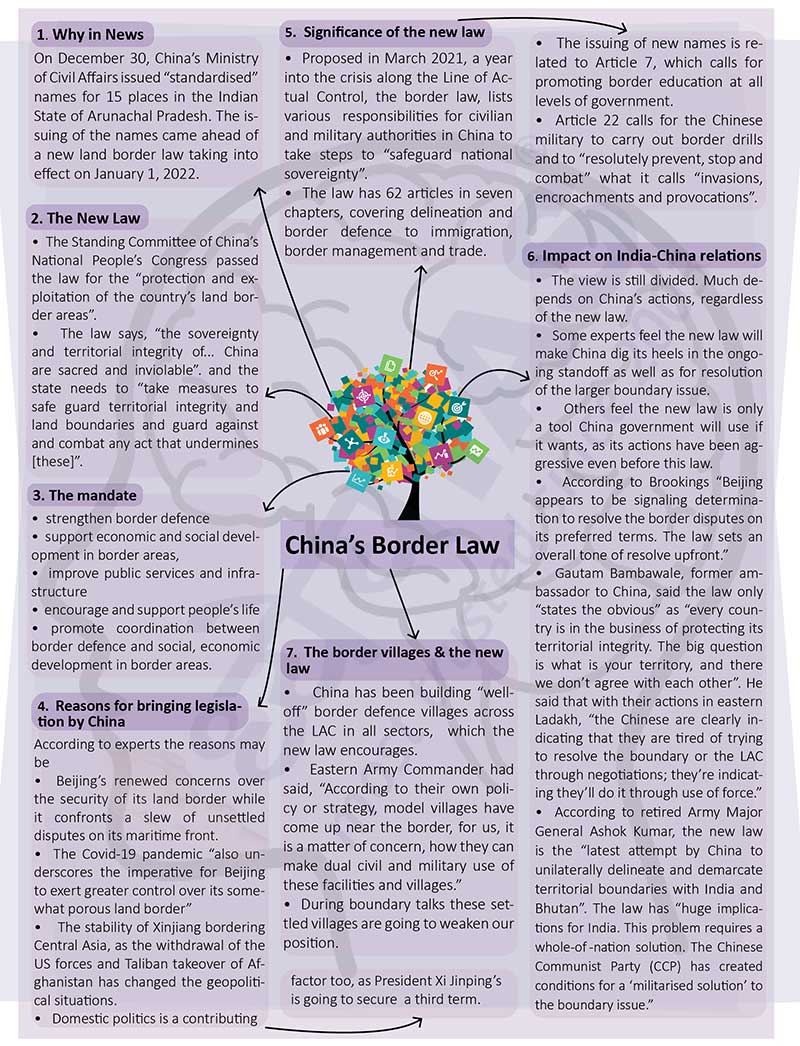Why in News?
- On December 30, China’s Ministry of Civil Affairs issued “standardised” names for 15 places in the Indian State of Arunachal Pradesh. The issuing of the names came ahead of a new land border law taking into effect on January 1, 2022.
The New Law
- The Standing Committee of China’s National People’s Congress passed the law for the “protection and exploitation of the country’s land border areas”.
- The law says, “the sovereignty and territorial integrity of... China are sacred and inviolable”. and the state needs to “take measures to safe guard territorial integrity and land boundaries and guard against and combat any act that undermines [these]”.
The mandate
- strengthen border defence
- support economic and social development in border areas,
- improve public services and infrastructure
- encourage and support people’s life
- promote coordination between border defence and social, economic development in border areas.
Reasons for bringing legislation by China
According to experts the reasons may be
- Beijing’s renewed concerns over the security of its land border while it confronts a slew of unsettled disputes on its maritime front.
- The Covid-19 pandemic “also underscores the imperative for Beijing to exert greater control over its somewhat porous land border”
- The stability of Xinjiang bordering Central Asia, as the withdrawal of the US forces and Taliban takeover of Afghanistan has changed the geopolitical situations.
- Domestic politics is a contributing factor too, as President Xi Jinping’s is going to secure a third term.
Significance of the new law
- Proposed in March 2021, a year into the crisis along the Line of Actual Control, the border law, lists various responsibilities for civilian and military authorities in China to take steps to “safeguard national sovereignty”.
- The law has 62 articles in seven chapters, covering delineation and border defence to immigration, border management and trade.
- The issuing of new names is related to Article 7, which calls for promoting border education at all levels of government.
- Article 22 calls for the Chinese military to carry out border drills and to “resolutely prevent, stop and combat” what it calls “invasions, encroachments and provocations”.
Impact on India-China relations
- The view is still divided. Much depends on China’s actions, regardless of the new law.
- Some experts feel the new law will make China dig its heels in the ongoing standoff as well as for resolution of the larger boundary issue.
- Others feel the new law is only a tool China government will use if it wants, as its actions have been aggressive even before this law.
- According to Brookings “Beijing appears to be signaling determination to resolve the border disputes on its preferred terms. The law sets an overall tone of resolve upfront.”
- Gautam Bambawale, former ambassador to China, said the law only “states the obvious” as “every country is in the business of protecting its territorial integrity. The big question is what is your territory, and there we don’t agree with each other”. He said that with their actions in eastern Ladakh, “the Chinese are clearly indicating that they are tired of trying to resolve the boundary or the LAC through negotiations; they’re indicating they’ll do it through use of force.”
- According to retired Army Major General Ashok Kumar, the new law is the “latest attempt by China to unilaterally delineate and demarcate territorial boundaries with India and Bhutan”. The law has “huge implications for India. This problem requires a whole-of -nation solution. The Chinese Communist Party (CCP) has created conditions for a ‘militarised solution’ to the boundary issue.”
























